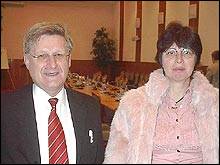"Observance and development of human rights, and one of its components, freedom of worship… [is] very important for… Ukraine."
!["Observance and development of human rights, and one of its components, freedom of worship… [is] very important for… Ukraine." - 1 "Observance and development of human rights, and one of its components, freedom of worship… [is] very important for… Ukraine." - фото 1](/uploads/770x433_DIR/media_news/2020/05/5ed11ca3c5fb1997154164.jpeg)
 Interview with the director of Human Rights Without Frontiers International, Prof. Willy Fautre, and Prof. Yevhenia Dodina of the Odesa National Legal Academy.
Interview with the director of Human Rights Without Frontiers International, Prof. Willy Fautre, and Prof. Yevhenia Dodina of the Odesa National Legal Academy.
— Prof. Fautre, please tell us about Human Rights Without Frontiers.
Prof. Fautre: Human Rights Without Frontiers is a non-governmental organization which protects human rights, including the freedoms of believers, and opposes religious intolerance and discrimination. We have branches in Belgium, the USA, China and Nepal, and we have collaborators in Japan, South Korea, Georgia, Romania, and other countries.
—How long has the organization represented by you existed, and what sources do you use to study the situation in various countries?
Prof. Fautre: The organization was established in 1989. Its main purpose is to protect human rights and religious freedom in European institutions. We receive information from our branches and from a network of correspondents, experts, and journalists who provide us with their analyses, results, and information on laws and practices in various countries. Similarly, in Ukraine we receive information from Prof. Dodina in Odesa. Ukraine is our special interest, as this is part of the European policy of neighborhood. Observance and development of human rights, and one of its components, freedom of worship, equality of religions, tolerance and the absence of discrimination, are very important for the united European community and Ukraine.
—Therefore, the first step of the work of Human Rights Without Frontiers is gathering information from various sources. The next step should be analysis of the information received.
Prof. Fautre: Over the last two years, the first step regarding Ukraine was to get a true picture of the situation in the country and of the relations between various religions, which is sometimes problematic for us. Another important problem is that of the intervention of religious groups in politics and of politics in external religious matters. The next step will be to have stronger influence, which we plan for the end of this year. A priority will be to spread materials about the registration of religious organizations among Ukrainians who make political decisions and among state officials.
—Professor, how many people work for your organization in Ukraine?
Professor Fautre: We have no official representative office in your country, but we have a representative who gathers information and submits it to our office. Our priority is to inform the Ukrainian government and Parliament of the positive and negative experience in the European Union in matters of religious education in state educational institutions and of the status of minority religions.
—Prof. Dodina, how long have you worked for this organization which protects human rights? Do religious organizations or individual citizens approach you with specific problems?
Prof. Dodina: I have worked for Human Rights Without Frontiers for two years. We study the situation by analyzing mass media reports. Publications about the rights of religious organizations and church-state relations are gathered by me, translated into English, and appear in publications of Human Rights Without Frontiers to make information from Ukraine available to everyone interested in these problems. We are an information-analyzing center, gathering information, analyzing it, and monitoring the situation in Ukraine. We do not represent any parties in court or directly defend human rights.
—Prof. Fautre, is the information, gathered by your organization used by members of the European Parliament or other European institutions?
Prof. Fautre: Yes, we gather information on religious rights from various countries, such as Saudi Arabia, Sri Lanka, Vietnam and Nepal. The information is updated each day and sent to the members of a special committee of the European Parliament, European Commission, Council of Europe, and other organizations, universities, faculties of law and individual people interested in problems of religious freedom and the history and sociology of religion.
— Thanks for the interesting interview.
Interview conducted by Vasyl Korshak, Kyiv, 19 May, 2006.









